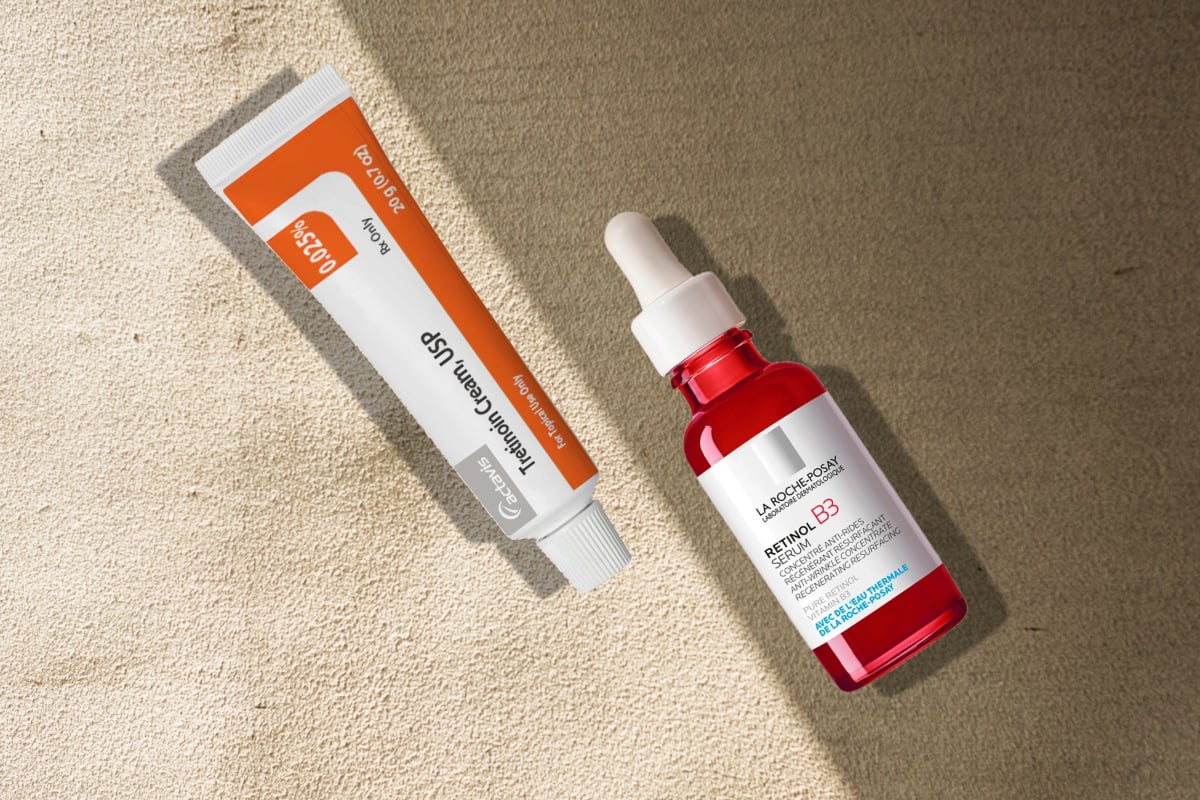What is succinic acid?
Have you ever heard of succinic acid? This might sound like a complex chemical, but it’s not. Succinic acid is a dicarboxylic acid found in amber and a variety of plants and foods, such as broccoli, fresh meat extracts, and various cheeses. Unlike other acids you might know in skincare, like glycolic or salicylic acids, succinic acid doesn’t exfoliate your skin. Instead, it’s effective in fighting acne, excess sebum, and early signs of aging.
How does it work?
Acne
- Succinic acid has a double role in combating acne: it kills acne-causing bacteria and reduces redness and swelling (anti-inflammatory). This means it can treat various forms of breakouts, from surface-level to inflamed acne (cystic acne).
- Research shows that even a tiny amount (0.1%) of succinic acid can reduce bacteria growth by 90%, which is even better than what salicylic acid can do.[1][2]
- By getting rid of these bacteria, succinic acid slows down the acne cycle, resulting in fewer blemishes and clearer skin over time.
Anti-Aging
- According to some studies, succinic acid inhibits the enzymes that cause collagen to break down. Collagen is like the scaffolding of your skin—it’s the protein that gives your skin elasticity. More collagen means firmer skin and fewer wrinkles.
- Succinic acid accelerates cell metabolism, so it can stimulate skin renewal (the body’s natural process of creating new cells and shedding old ones). However, unlike harsher chemical acids, which can damage the skin’s barrier, succinic acid restores the skin’s balance and is both moisturizing and soothing.
Antioxidant
- Succinic acid is a natural antioxidant that neutralizes free radicals—these are harmful molecules that can damage our skin cells. By tackling these free radicals, succinic acid protects our skin from the damage that speeds up aging.[3]
Sebum Control
- When the skin produces too much sebum, especially in those with oily and acne-prone skin, it often leads to inflammation. This is where succinic acid comes in handy. It has anti-inflammatory properties that calm this inflammation. By doing so, succinic acid can regulate those overactive sebaceous glands, reducing the amount of excess oil our skin produces. Plus, being a key player in cellular metabolism, succinic acid boosts the health of our skin cells. With healthier cells, our skin can maintain a more balanced level of sebum production.
Moisturizer
- Some studies show that the combination of succinic acid and hyaluronic acid (a humectant that draws moisture) can enhance skin hydration and texture.
Side effects and other concerns
Unlike other acids, succinic acid is well tolerated and gentle enough even for sensitive and acne-prone skin. But it’s not all smooth sailing; some people might still notice their skin getting a bit red, itchy, or swollen, especially when using products with high concentrations of succinic acid.
And just like other acids, succinic acid accelerates skin cell turnover. The catch? If you go overboard with it, your skin barrier might get a bit cranky, leading to dryness or even some peeling. This can get even worse if you’re mixing succinic acid with retinoids or other acids that exfoliate. The trick is to balance things out. Use products with hydrating and barrier-strengthening ingredients to reduce barrier damage.
How to use succinic acid
Succinic acid works best in serums or as a spot treatment. Apply succinic acid after cleansing but before heavier creams or oils, focusing on the areas prone to excess oil and breakouts. Then, layer on a hydrating moisturizer with hyaluronic acid or ceramides. If your skin tolerates it, you can use succinic acid every night, but we recommend using it once or twice a week for the first month to allow your skin to build tolerance.
The verdict
Succinic acid should be on your radar, but it’s kind of like the new kid on the skincare block. It’s showing a lot of promise, but the truth is that it hasn’t been studied as much as old favorites like retinol, vitamin C, or the classic chemical peels. We’re still learning what it can do.
However, forward-thinking brands such as The Inkey List (2% Succinic Acid Treatment) and Perricone MD (Acne Relief Maximum Strength Spot Gel) have already rolled out products with succinic acid. It’s a bit early to call it a game-changer, but it’s definitely one to watch!
References
- Wang Y, Kuo S, Shu M, Yu J, Huang S, Dai A, Two A, Gallo RL, Huang CM. Staphylococcus epidermidis in the human skin microbiome mediates fermentation to inhibit the growth of Propionibacterium acnes: implications of probiotics in acne vulgaris. Appl Microbiol Biotechnol. 2014 Jan;98(1):411-24. doi: 10.1007/s00253-013-5394-8.
- Lawrence Theunissen, Francois Courbes. Succinic acid: a promising multi-functional ingredient for cosmetic and personal care applications. Azienda Chimica e Farmaceutica, March 2018.
- Turkevych, Alexander & Derkach, Natalia & Kupriyanova, Anna & Zubair, Leila & Turkevych, Marta & Turkevych, Danylo. (2020). Improving Skin Quality With Hyaluronic And Succinic Acid.




![Does resveratrol in red wine benefit your skin? While sipping on a glass of red wine can be a delightful experience, relying on it for skincare benefits is not the best idea. Sure, red wine contains a smidge of resveratrol, but let's put things into perspective. The concentration of resveratrol in red wine is relatively low. Red wines, specifically Pinot noir from France, typically contain 0.361-1.972 mg of resveratrol per liter.[8] To hit that reference dose of 500mg of resveratrol, you'd need to drink a lot of wine. We're talking about downing anywhere from 100 to 1000 glasses per day. It's a scene straight out of a wine lover's wildest dreams, but definitely not the healthiest approach. Resveratrol Benefits for Skin](https://womensconcepts.com/wp-content/uploads/2022/03/Resveratrol-Benefits-for-Skin.jpg)
